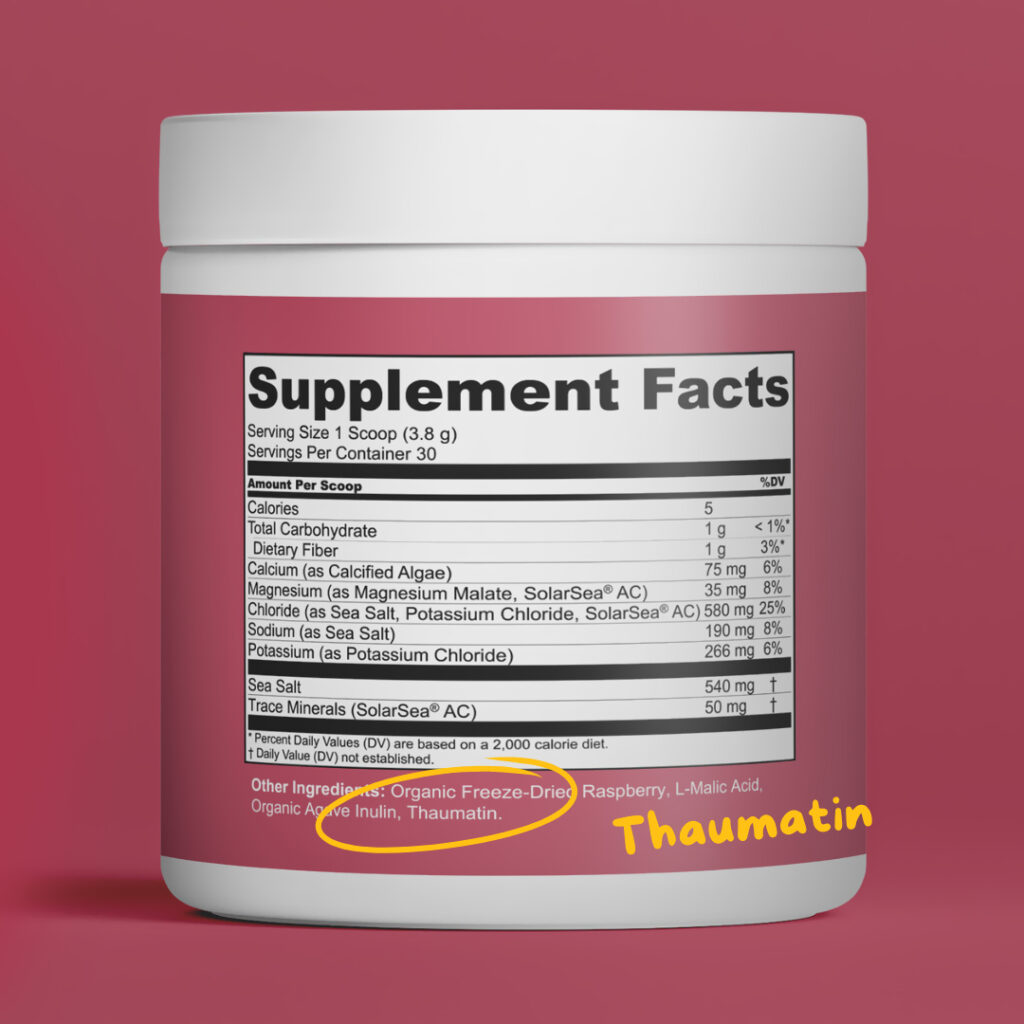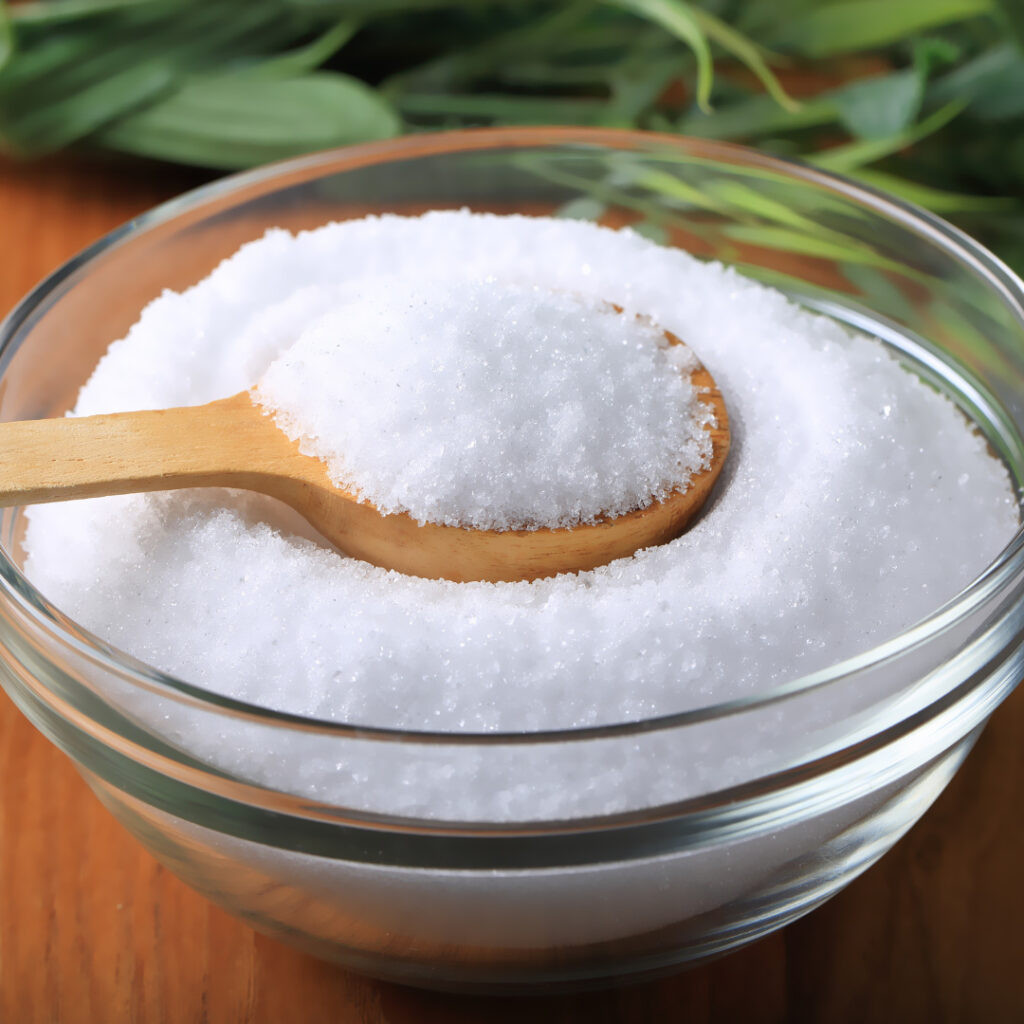What Is Thaumatin? The Zero-Calorie Protein Sweetener Explained
At Fringe, when we want to include a bit of sweetness in our supplements we turn to thaumatin, a little-known sweetener derived from the fruit of the katempfe plant (Thaumatococcus danielli). This plant is native to West Africa and grows naturally in countries including Ghana, Nigeria, and Cameroon.
Thaumatin is unique among natural sweeteners in being a protein. As a protein, it’s made up of chains of amino acids, like other dietary proteins such as whey. These amino acid chains fold into a complex 3D structure, which can bind to sweet taste receptors on the tongue.

Thaumatin
Thaumatin is incredibly sweet compared to sucrose (table sugar) – when compared weight-for-weight, it is 1600 to 3200 times sweeter. This means that only a miniscule amount is needed to provide sweetness to a product, which results in a negligeable energy (aka zero calorie) contribution. The thaumatin protein binds to the same sweet taste receptor as sucrose, albeit to different receptor sites. This difference in taste receptor activation leads to a similar sweet sensation, but one that is more intense and longer lasting.
How Does Thaumatin Compare to Other Natural Sweeteners?
Natural sweeteners can be classed into different categories, including protein-based, glycoside-based, sugar alcohols, and whole-food derived natural sugars. Each sweetener has different characteristics, such as level of sweetness and glycemic index. They also have different uses and safety profiles.

Protein Based Sweeteners – Thaumatin is the only sweetener that falls into this category. As already mentioned, it’s a super-sweet tasting, zero calorie sweetener derived from the katempfe plant. It’s used as a sweetener in beverages, protein powder, dietary supplements, oral care, and gum.
Glycoside-Based Sweeteners – Stevia and monk fruit are the most common glycoside-based sweeteners. A glycoside is a natural plant-derived compound made of sugar attached to another molecule but is itself not a carbohydrate or sugar like sucrose is. Stevia is 200-300 times sweeter than sucrose, while monk fruit is 100-250 times sweeter. Both are commonly used as sweeteners in beverages, supplements, and natural products. There is some evidence that stevia may negatively impact the gut microbiota.
Sugar Alcohols – The most common sugar alcohol sweeteners are erythritol, xylitol, sorbitol, and maltitol. Sugar alcohols are molecules that include both a sugar and an alcohol component, and because of this structure, most are only partially digested and absorbed. As such, they don’t raise blood sugar the way regular sugars do and provide far fewer calories. However, this also makes them prone to causing digestive upset, as they pass into the large intestine largely undigested, where our gut bacteria ferment them and cause gas. Erythritol tends to be better tolerated, causing minimal GI problems. Sugar alcohols are usually around the same sweetness as sucrose, and are commonly used in sugar-free candies and chocolates, baked goods, and gum.
Whole-Food Derived Natural Sweeteners – This category of sweeteners includes things like honey, coconut sugar, fruit juice concentrate, maple syrup, molasses, lacuma powder, and brown rice syrup. It does not include refined sweeteners, such as high fructose corn syrup. Whole-food sweeteners are minimally processed and naturally contain other nutrients, such as fiber, vitamins and minerals. In contrast to protein-derived and glycoside-derived, which are non-caloric and have no glycemic impact (that is, they don’t raise blood sugar), and sugar alcohol sweeteners, which provide some calories and have minimal glycemic impact, whole-food derived sweeteners provide calories and raise blood sugar and insulin levels. Whole-food derived natural sweetners are often used in “clean” label formulated food products, such as baking products and energy bars.

Has Thaumatin Been Proven to be Safe?
Yes! Thaumatin has GRAS status in the US (Generally Recognized As Safe). It has been evaluated for toxicity, genotoxicity, carcinogenicity, and adverse metabolic effects by the FDA which found no evidence of any harm based on its safety testing and toxicology studies.
Since thaumatin is a protein, it is reasonable to wonder if it may cause allergic reactions in some people. However, unlike regular dietary proteins, thaumatin is used in miniscule amounts (in the range of micrograms to milligrams), the exposure levels are so low that allergic reactions are unlikely, although they have been observed particularly when inhaled. Thaumatin is not listed as a major allergen by food regulatory agencies like the FDA.
It’s important to note that the thaumatin used as a natural sweetener (from the katempfe fruit) is different from thaumatin-like proteins found in foods such as apples, cherry, kiwi, olives, grape, tomato, and birch pollen. These are involved in plant defenses, not sweetness, and do carry a risk of allergenicity, especially in people with pollen-food allergy or latex-fruit syndrome.
Does Thaumatin Have Health Benefits?
Although most research on thaumatin has focused on its safety and utility as a sweetener, there is some evidence that it may confer some health benefits. For example, a study conducted by the Leibniz Institute for Food Systems Biology at the Technical University of Munich investigated how thaumatin is digested in the stomach and found that during digestion, thaumatin releases bitter-tasting peptides. These peptides were observed to stimulate acid secretion in human stomach cells and modulate inflammatory responses induced by Helicobacter pylori proteins, a bacterium linked to gastric inflammation and ulcers. This suggests that thaumatin or its digestion products might have potential anti-inflammatory properties in the stomach.
While there are some reports online that thaumatin may have anti-cancer or anti-hypertensive (blood pressure lowering) effects, these statements are not currently supported by clinical research.

Summary
Thaumatin is a protein-derived natural sweetener that contributes zero calories and has no impact on blood sugar or insulin. At typical food or supplement levels, it has non known adverse effects and stands out among other sweeteners for its lack of documented side effects. Thaumatin is an ideal sweetener to use in Fringe supplements, as it’s consistent with our small scoops mission to produce supplements using the cleanest, safest ingredients possible.
about the author
Dr. Genevieve Newton, DC, PhD spent close to 20 years as a researcher and educator in the field of nutritional sciences before joining Fringe as its Scientific Director. Gen’s job is to “bring the science” that supports Fringe’s products and education. She is passionate about all things Fringe, and is a deep believer in healing body, mind and spirit using the gifts of the natural world.
The contents in this blog; such as text, content, graphics are intended for educational purposes only. The Content is not intended to substitute for professional medical advice, diagnosis, or treatment. Always seek the advice of your healthcare provider.
